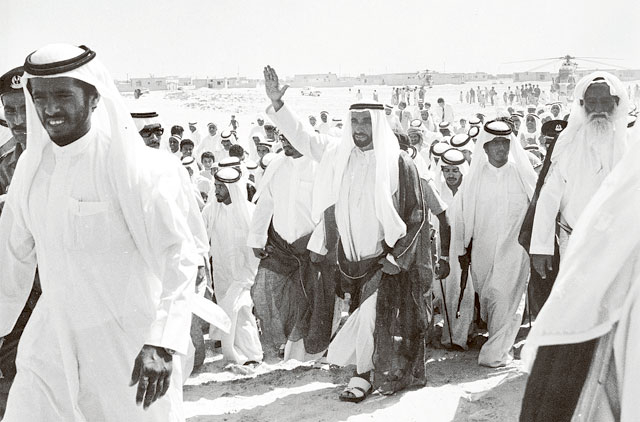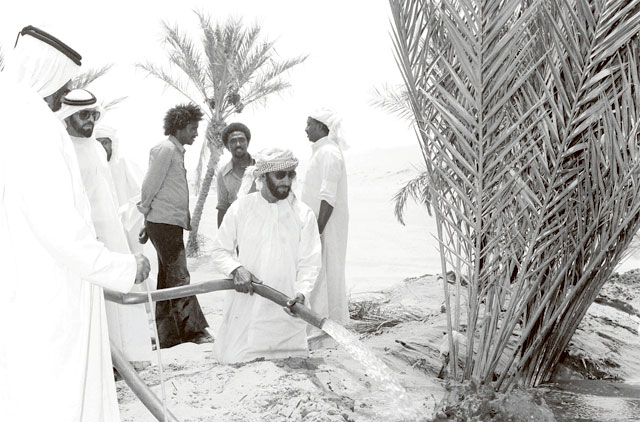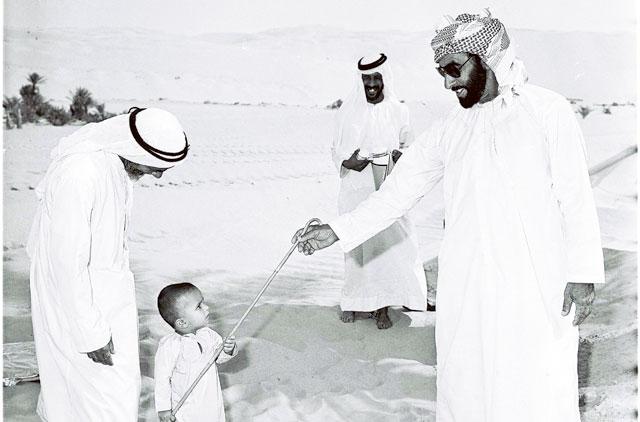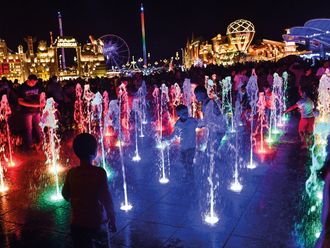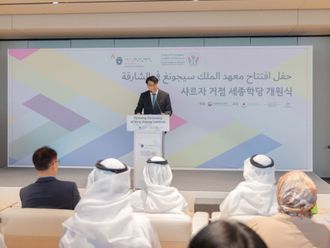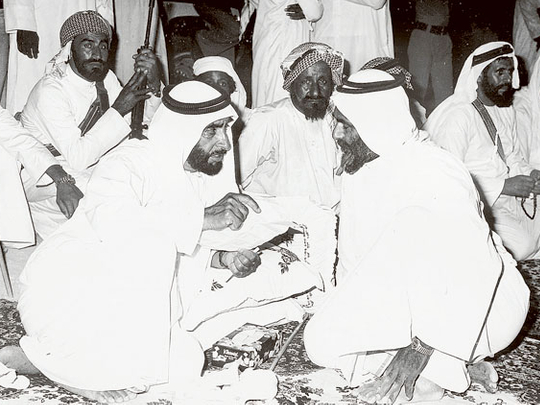
1918
Shaikh Zayed Bin Sultan Al Nahyan is born into the Bani Yas family in the Jahili area, Al Ain. He was the fourth son of Shaikh Sultan Bin Zayed Al Nahyan. Shaikh Zayed is assigned to the care of his tutor, guide and counsellor, Syed Abdullah Bin Ganem.
1926
Shaikh Zayed uses pen and paper to write. By the age of 10, Shaikh Zayed memorises most of the verses from the Quran.
1946
Shaikh Zayed is appointed the Ruler’s Representative in the Eastern Region, his office is in Al Muwaiji in Al Ain.
1953
Shaikh Zayed travels abroad for the first time, visiting countries including France, Great Britain, and the US. He is impressed by the progress he sees in these countries and wants to pursue a similar approach to development in his own country. While visiting some hospitals in France, he is impressed by the sight of healthy babies and ponders about the plight of thousands of malnourished children back home and decides to work for their welfare.
1955
With the approval of the British Government and the help of the Trucial Oman Levies, forces of the Sultan of Muscat and Oman and those of the Ruler of Abu Dhabi, move into the Buraimi area. The dispute involved the demarcation lines between Saudi Arabia and Abu Dhabi. The tension in the area is put to an end as the British and the Saudis agree to refer the issue to international arbitration.
Between 1956-1963
Shaikh Zayed is anxious to reach an understanding with the Saudis in resolving the issue.
1958
Abu Dhabi Marine Areas, a consortium of foreign oil companies led by BP, find the first oil field at Umm Shaif.
1959
Shaikh Zayed opens the first Al Nahyaniah Primary School in Al Ain.
1961
Shaikh Zayed orders the building of the first mud road that runs from the palace to Al Maqta Bridge in Abu Dhabi. He mobilises all the available trucks at the time to transport material for the construction of the road.
1962
First oil export from Das Island.
1964
Shaikh Zayed and his brother, Shaikh Shakbout, call on King Faisal Bin Abdul Aziz Al Saud of Saudi Arabia. The trip manages to establish friendly ties with the neighbouring country.
1966
Shaikh Zayed becomes the new Ruler of Abu Dhabi. The year also witnesses the establishment of a number of new administrative departments headed by members of the Al Nahyan ruling family and some prominent citizens. The departments cover different administrative areas, including the courts in the Eastern Province, public works, electricity, water supply, health, education, customs, police and public security, agriculture, municipalities and land registration, justice and labour.
An expanding economy allows the wealthy to replace their mud/brick compounds with new ones, but a majority of people are still not able to afford this luxury. The Abu Dhabi government begins building concrete houses with electricity and running water for the first time. By the early 1970s, additional low-cost houses are also built in Ajman, Fujairah, Ras Al Khaimah and Umm Al Quwain.
1967
The Department is later renamed the Planning Council with Shaikh Zayed as President. The Council is established with the purpose of promoting development projects within Abu Dhabi. Shaikh Zayed chairs the Council’s meetings while his eldest son, Shaikh Khalifa, takes up the post of first Deputy Chairman of the Department.
Shaikh Zayed pays a friendly visit to Saudi Arabia. The visit facilitates the first direct negotiations between Shaikh Zayed and King Faisal as the two leaders decide to work for a peaceful solution to the longstanding border dispute between the neighbouring states.
1968
In a speech to the House of Commons, British Prime Minister Harold Wilson, announces the plan for the complete withdrawal of all British forces from the Gulf by the end of 1971.
Abu Dhabi Airport opens under the name of “Al Bateen Airport”.
Al Maqta Bridge is built in Abu Dhabi.
Shaikh Rashid Bin Saeed Al Maktoum, late Ruler of Dubai, meets Shaikh Zayed on the border between the two emirates at Assemaih. The meeting culminates in a formal agreement to merge their two emirates into a union that would jointly cover areas of social services, security, defence, foreign affairs and immigration. The neighbouring Rulers of Ajman, Bahrain, Fujairah, Sharjah, Qatar, Ras Al Khaimah and Umm Al Quwain are also invited to participate and become part of a larger federation.
The Rulers of the ‘Trucial States’, Qatar and Bahrain, meet for discussions in Dubai. The draft of an agreement between the nine Rulers for the creation of a federation is prepared to be signed at the conference. Following lengthy discussions over its content, the agreement is finally signed after altering some of its provisions. The Supreme Council is created with the nine Rulers as members, who are to draw up a constitution, formulate policies, legislate federal laws, and prepare an annual budget. The agreement creates three main branches, legislative, judiciary and executive and a date is set to put the agreement into effect. Yet, none of the provisions come into effect by the set date.
1969
The establishment of Mina Zayed enables the berthing of huge trans-ocean commercial vessels in Abu Dhabi.
1970
Following Shaikh Zayed’s interest in preserving wildlife, a first of its kind animal sanctuary comes up near Al Ain, and is followed by a second one on the island of Sir Bani Yas.
Iran lays claim to the islands of Greater and Lesser Tunbs and Abu Mousa. The following year, Iran occupies the three islands. Since then, the UAE has been repeatedly calling for a peaceful resolution or the use of international arbitration to resolve the issue.
1971
Shaikh Zayed, representing the UAE, and Sir Geoffrey Arthur, the last Political Resident in the Gulf, sign a treaty of friendship between Britain and the UAE. Finally Britain evacuates from the Gulf.
The federation is formed on December 2. The newly-formed federation including the emirates of Abu Dhabi, Dubai, Sharjah, Ajman, Umm Al Quwain and Fujairah takes shape under the able leadership of Shaikh Zayed. The emirate of Ras Al Khaimah joins a year later. The federation declares a policy of total non-alignment and joins the Non-Aligned Movement.
The Federal National Council is formed under the Provisional Constitution as a permanent component of the country’s governing structure, which also includes the Supreme Council, President, Cabinet and Judiciary.
Shaikh Zayed is elected as President and Shaikh Rashid Bin Saeed Al Maktoum as Vice-President of the UAE.
He inaugurates the 50-member Abu Dhabi National Consultative Council assembly’s first meeting.
He forms the Abu Dhabi Fund for Economic Development to distribute wealth among poorer Arab states.
1972
Shaikh Zayed inaugurates the first Federal National Council session in Abu Dhabi.
1973
The Executive Council replaces the Abu Dhabi Cabinet. The Council comprises the Emirates’ government departments.
The UAE joins the Arab League and the Islamic Conference Pact in their stance in the October war against Israel.
The official currency of UAE — the dirham — is issued.
1974
Shaikh Zayed allocates 28 per cent of Abu Dhabi’s income towards assisting Arab, Islamic, and developing countries.
The UAE Cabinet approves the merger of the oil departments from Abu Dhabi, Dubai and Sharjah into a single UAE Petroleum Ministry.
1974-75
The UAE and its neighbour, Saudi Arabia, begin discussions over their common borders. Later, Shaikh Zayed and King Faisal sign an agreement resolving the border dispute between the states.
1975
The Abu Dhabi departments of Education, Health, and Police and Public Security come under the federal ministries.
1976
The Abu Dhabi Investment Authority (ADIA) is established with the sole purpose of investing the money generated from oil revenues.
The Federal Supreme Council issues a landmark decision to merge all the Armed forces into one command. Shaikh Zayed is appointed Supreme Commander.
Emirates Telecommunications (etisalat) formerly known as Emirtel is established.
UAE University is established.
1979
Shaikh Zayed condemns the invasion of Afghanistan by the Soviet Union.
Zayed Sports City is inaugurated in Abu Dhabi.
1981
The Gulf Cooperation Council, a union between the states of Bahrain, Kuwait, Oman, Qatar, Saudi Arabia and the UAE, is formed with the purpose of establishing joint projects in various fields. The Council’s first meeting is held in Abu Dhabi and hosted by Shaikh Zayed.
Shaikh Zayed lays the foundation of a $700 million project involving the development of one of the largest oil fields.
1982
Shaikh Zayed stresses the importance of Egypt being a crucial part of the Arab world and states the Arab world could not function without its presence and active role in Arab affairs.
Shaikh Zayed inaugurates the multi-billion dollar petroleum industrial complex in Ruwais, Abu Dhabi.
Shaikh Zayed attends the first convocation of the UAE University in Al Ain.
The new Abu Dhabi International Airport begins operations.
1983
On the occasion of the inauguration of the new headquarters of the Abu Dhabi Women’s Association, Shaikh Zayed states that, according to Islamic and traditional values, a woman’s role is the upbringing of children but she should not be confined only to that role.
1986
Shaikh Zayed calls upon fighting factions to reconcile their differences and offers his mediation in bringing about much-needed peace and reconciliation in Yemen.
1987
Shaikh Zayed expresses his support for the Saudi authorities in their effort in controlling the clash between Saudi forces and Iranian demonstrators during the Haj (pilgrimage).
Shaikh Zayed calls for an end to the seven-year-old war between Iran and Iraq, which he feels would be beneficial to all Muslim countries. He also emphasises the fact that the war has invited an unwanted foreign presence in the area.
1989
Being the first leader to call for Egypt’s return to the Arab brotherhood, Shaikh Zayed applauds the Arab League’s decision reinstating Egypt back into its fold.
1990
The UAE condemns the Iraqi invasion of Kuwait. Shaikh Zayed states the UAE has no choice but to support the Kuwaitis. He rejects Saddam Hussain’s claim of a connection between the Palestinian issue and the Kuwaiti invasion. Shaikh Zayed refuses to compromise with Saddam, declaring it was not ‘our duty to save his face’. He warns that the Arab League’s bureaucratic way of operation may further delay an early solution to the conflict.
Shaikh Zayed issues a decree directing Cabinet ministers to stick to their portfolios. The decree is issued after the passing of Shaikh Rashid Bin Saeed Al Maktoum, Ruler of Dubai, and the upheaval in the Gulf following the invasion of Kuwait.
1991
Shaikh Zayed states it was highly unfair for thousands of Iraqis to suffer through no fault of their own. He is the first Arab leader to recommend sending humanitarian aid to Iraq.
With the exorbitant increase in marriage expenses, Shaikh Zayed orders the establishment of the Marriage Fund to assist young Emiratis financially.
1993
Shaikh Zayed strongly criticises Europe for its indifference to the sufferings of Muslims in the war, which broke out in former Yugoslavia in 1990.
Shaikh Zayed clearly specifies the UAE was ready to hold direct talks with Iran in resolving the dispute over the occupied UAE islands of Greater and Lesser Tunbs and Abu Mousa.
1994
Shaikh Zayed again strongly criticises Western countries for turning a blind eye to the Bosnia-Herzegovina problem. He accuses the Western powers of “supporting the oppressor against the oppressed” due to the arms embargo imposed on the Muslims.
A civil war breaks out between North and South Yemen over the unification of their countries. Shaikh Zayed describes the settling of disputes by military means as unacceptable.
Shaikh Zayed states that Saddam Hussain would be welcomed back into the Arab fold if he would ‘follow the right path’.
Shaikh Zayed questions certain Western countries’ claim of being democratic when human rights are openly being violated in Bosnia and Somalia. He also calls upon Arabs and Muslims to drop their differences and form an umbrella group.
1995
The Moroccan Historian Society awards Shaikh Zayed the Arab History Golden Medal for
supporting history and historical studies.
Shaikh Zayed is awarded a gold medal from the Food and Agriculture Organisation (FAO) for contributions to agricultural development in the UAE and other parts of the world.
Shaikh Zayed stresses the fact that 18 million Iraqis were unjustly paying the price on Saddam Hussain’s behalf and calls for an immediate lifting of the sanctions imposed on the country after the 1991 Gulf War.
1996
The Supreme Council agrees to change the UAE’s temporary constitution to a permanent one and names Abu Dhabi the federal capital of the UAE.
Shaikh Zayed is named the development personality at the international level, as per the poll organised by the Jeddah-based Middle East Centre for Media Research and Studies.
After undergoing neck surgery in the US, Shaikh Zayed is welcomed back by the community with festivities and events marking his safe return.
1997
Shaikh Zayed is awarded the Golden Panda award by the World Wildlife Fund, the first award to a world leader by the fund. The award was given to him for his efforts to protect wildlife.
Shaikh Zayed receives an honorary doctorship in the field of agriculture from Egyptian university Ain Shams.
Shaikh Zayed expresses his support and encouragement for Emirati women to join the Federal National Council (FNC).
1998
Shaikh Zayed is awarded the shield of the organisation for the noble stances he took towards Islamic and Arab causes by the Islamic Education, Science and Culture Organisation.
1999
Shaikh Zayed and Sultan Qaboos Bin Saeed sign an agreement defining the borders between the two countries. Thanks to the untiring efforts of Shaikh Zayed, the agreement manages to resolve border differences between the two countries.
The rapprochement between Saudi Arabia and Iran triggers criticism from the UAE.
Shaikh Zayed states the UAE was treated in a cold and alienating manner. The issue is resolved following Qatar’s mediation.
2000
The Rulers of Bahrain and Qatar exchange visits and agree to set up committees to resolve differences between the two states.
Shaikh Zayed undergoes a successful kidney transplant on August 28 in the US and returns home to a warm welcome prior to the country’s 29th National Day on December 2.
Shaikh Zayed is awarded the Shaikha Fatima Benevolent Award in recognition of his humanitarian contributions.
Shaikh Zayed is awarded the ‘Golden Shield’ of the Arab and Muslim Historians Association for his services and contributions to scholars in the field.
Shaikh Zayed is named personality of the year by the Dubai Holy Quran Award for the services he rendered for Islam and Muslims, and for his efforts to create solidarity among Islamic countries.
Shaikh Zayed is greeted on his safe return home following a kidney transplant. Celebrations take place throughout the UAE for the President’s safe return; both nationals and expatriates participate.
Lebanon honours Shaikh Zayed as the environmental personality of the year.
2001
Shaikh Zayed calls for Arab solidarity and Muslim cooperation. “Should Arabs unite, Islamic nations would surely stand by them, which would lead to a big triumph for both the Arabs and the Islamic nations.”
Shaikh Zayed is awarded the Medal of the International Food Day by the United Nation’s Food and Agricultural Organisation (FAO), in appreciation of his contribution to helping the needy worldwide.
Shaikh Zayed is decorated with the first degree of the Abubakar Siddiq Order for Charity and Humanitarian Services, by the association of Arab Red Crescent Societies. The highest order is given in recognition of Shaikh Zayed’s charitable and humanitarian efforts.
In response to the 9/11 attacks, Shaikh Zayed reaffirms the UAE’s support for an international campaign against terrorism. “We reaffirm our willingness to contribute in any way possible to an international campaign to eradicate terrorism in all its forms and manifestations”, Shaikh Zayed says in a message sent to US President George W. Bush and British Prime Minister Tony Blair.
Shaikh Zayed reaffirms the UAE’s position in rejecting terrorism. He further states the fight against terrorism should also include ending Israeli aggression against the Palestinian people. He calls on members of the UN Security Council to exert the utmost effort towards the establishment of an independent Palestinian state.
2002
Shaikh Zayed is honoured by the UNDP for his work to protect the environment and encourage conservation.
2003
While visiting the Eastern Region, Shaikh Zayed orders the building of 1,100 houses in Al Ain.
Shaikh Zayed signs the ratification of the Agreement for Preserving the Wildlife and Natural Habitats in the GCC, a programme outlining wildlife protection.
Shaikh Zayed issues a decree ordering the establishment of the Higher Council for Maternity and Childhood, working for the well-being of mothers and children in the UAE.
Under the orders of Shaikh Zayed, a reservoir with the capacity of ten million gallons of water, the first of its kind, is constructed in the Abjan area in Abu Dhabi.
2004
Shaikh Zayed issues a federal law on the formation of financial free zones in the country.
By virtue of Article 2 of Law No 8 for 2004, financial free zones will be established by a federal decree and will have a corporate body and be legally represented by a board chairman.
Shaikh Zayed tours the Eastern and Western Regions of Abu Dhabi. Shaikh Zayed’s tour reflects his policy of being constantly updated on the progress of projects designed to provide a comfortable life for citizens. Shaikh Zayed orders a review of the construction of a 12km marine channel and reclamation of a marshy area for the expansion of the Musaffah Industrial Area.
Shaikh Zayed issues Federal Decree No 3 of 2003 on the organisation of the telecommunications sector. The President issues another decree appointing members of a higher committee that will oversee the telecommunications sector.
Shaikh Zayed inspects a number of development and agricultural projects in the Eastern Region of Abu Dhabi. He orders the building of 150 houses, two mosques and establishment of 100 farms in the Dhahara area, and 100 farms and 100 houses in the Al Wafia area to be distributed to nationals.
Shaikh Zayed orders the reconstruction of more than 400 houses in Gaza City and Rafah destroyed by Israeli forces. Shaikh Zayed donates Dh20 million to help reconstruct over 400 homes of Palestinians destroyed by Israeli forces in Rafah. He instructs the Zayed Foundation for Charitable and Humanitarian Works to hand over the money to the Red Crescent Authority (RCA).
Shaikh Zayed tours development projects in Abu Dhabi. He inspects the progress of the Emirates Conferences Palace, which is nearing completion, and will be ready for the 25th GCC summit in December. Shaikh Zayed also tours Shaikh Zayed Mosque, Zayed Port and the fishermen’s association building.
May 22
Shaikh Zayed orders the reconstruction of more than 400 houses in Gaza City and Rafah destroyed by Israeli forces. The UAE Red Crescent Authority (RCA) has been assigned to reconstruct the houses.
November 02
Shaikh Zayed passes away after ruling the UAE since the birth of the federation more than three decades ago.
November 04
The United Nations General Assembly holds a special commemoration session for the late Shaikh Zayed.
Compiled by Gulf News Archives


